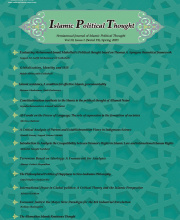۱.
کلیدواژهها:
Western political philosophy religion and politics political matter secularism justice
This article attempts to study the interactions between the two religious and secular domains in three intellectual periods in the history of Western political philosophy before Christ, in the ecclesiastical period and in the modern era, in which the separation of religion and state in Western political thought is a two-tier phenomenon in theory and practice. In other words, the internal layer of the philosophy seeks to reread and mentally separate political from nonpolitical matters so as to prescribe a just or a relatively not unjust criterion for political actors although, in practice, political actors and the others cannot avoid interacting. Again in other words, this article, while researching the just rights of citizens and the need for interaction and a link between political and nonpolitical actors, shows why and how in order for politics and the like to outline a moral theory that would fit a political theory in practice, cannot avoid separating and distinguishing the two in theory.
۲.
کلیدواژهها:
Islamic Civilization Integration divergence Muslim World
The formation of Islamic civilization based on its universal achievements is considered one of the most important turning points in the history of mankind. Throughout history, this civilization has experienced many ups and downs. The elements and factors shaping Islamic civilization have always tried to revive this civilization and universalize it throughout the time. With the collapse of the bipolar world order and the strengthening of regionalism in the international arena, Islamic countries are provided with a good opportunity to restore Islamic civilization and raising the concept of Islamic Ummah as an important pillar of power in the future world. The realization of this issue, however, requires the unification and integration of Islamic countries as main players of the revival of Islamic civilization.
۳.
کلیدواژهها:
Smart power think tanks Aggressive foreign policy Pressure and negotiation diplomacy Iran’s nuclear capacity
In the last decade, the concept of “smart power” was invented to guide the US diplomacy system so that the US could have a more assuring achievement process to its goals by using its national and international power capabilities. The concept of “Smart Power” was introduced after the formation of the concept of soft power by Joseph Nye, which refers to the simultaneous application of managed soft power and hard power. The concept of smart power for operationalization requires a variety of strategies designed by the US strategists and decision-making institutions. The question of this article is about the position of smart power in the US foreign policy toward Iran. It seems that with the coming of the Obama administration in the United States, the project of the smart power was operationalized by the diplomatic apparatus of the country, whose obvious example can be seen in the context of the kind of US confrontation with Iran’s nuclear program. With the use of pressure and negotiation strategy, the project pursues the gradual reduction of the nuclear capabilities and the rollback of Iran’s nuclear program. The authors believe that in case of success, this process can be generalized and spread to other areas of conflict and put America at an aggressive stand.
